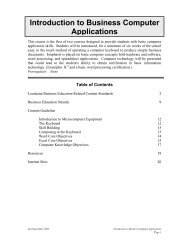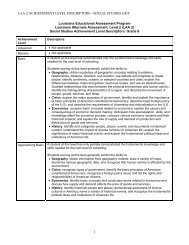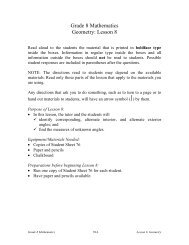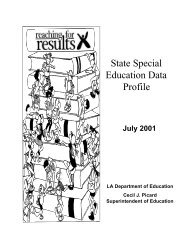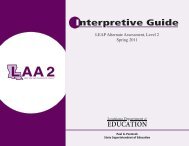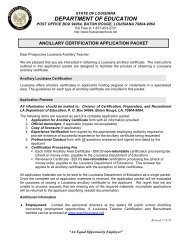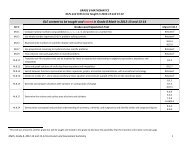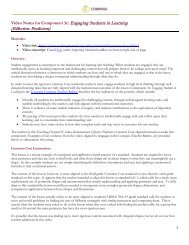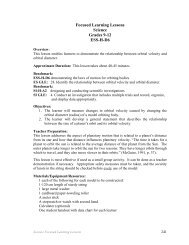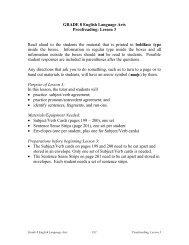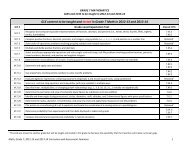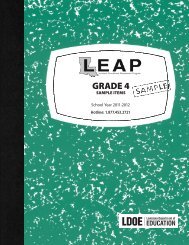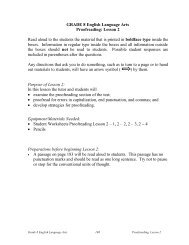School Improvement - Louisiana Department of Education
School Improvement - Louisiana Department of Education
School Improvement - Louisiana Department of Education
Create successful ePaper yourself
Turn your PDF publications into a flip-book with our unique Google optimized e-Paper software.
Criterion 3: Reliable and Valid Data Collection<br />
High quality data produce accurate and credible findings. Scientifically based research relies on measurements or<br />
observational methods that provide reliable and valid data across evaluators and observers and across multiple<br />
measurements and observations. Reliability implies that repeated measurements on subjects taken under similar<br />
circumstances or over time will produce similar results. If unreliable, the data may hinder the researcher’s ability<br />
to discern real differences among subjects or practices. To be considered valid, the data collected must measure<br />
the outcomes they were designed to measure, (i.e., that students’ math knowledge is what is being measured, not<br />
students’ ability to guess test answers). Knowledge <strong>of</strong> content must be measured, not students’ ability to guess<br />
test answers. There must be a match between the research question and the observed behavior on which the<br />
research findings are based.<br />
Questions about the quality <strong>of</strong> data collection include the following:<br />
• Was data collection conducted pr<strong>of</strong>essionally and consistently? For example, was there some system to<br />
ensure that different data collectors had the same focus and attention to detail? (i.e., training before data<br />
collection or inter‐rater reliability tests)<br />
• Were research biases minimized? Developers <strong>of</strong> reform models supply a natural example: was the<br />
evaluation <strong>of</strong> the reform model conducted by the model developers or by a third party, independent<br />
evaluator?<br />
• Does the study look at the appropriate information to address its questions? Are the measures valid?<br />
That is, do the measures discussed and analyzed correspond to the concepts being studied?<br />
• Are the data reliable? Did repeated measurements on subjects taken under similar circumstances<br />
produce similar results? Do the data represent counts <strong>of</strong> actions, records, responses, etc., that directly<br />
reflect what the practice or strategy is supposed to be doing and affecting?<br />
Criterion 4: Strong Research Design<br />
Studies must be designed to optimize the investigator’s ability to answer the research question or hypothesis.<br />
The following questions are relevant to research design:<br />
• Does the study follow an experimental or quasi‐experimental design? That is, are the subjects in the<br />
study divided randomly into at least two groups, with at least one group using the practice or strategy <strong>of</strong><br />
interest and one group not using it?<br />
• Does the study design contain appropriate controls in order to be able to evaluate the effects <strong>of</strong> the<br />
condition <strong>of</strong> interest? Were the subjects <strong>of</strong> the research randomly assigned, or were there other withincondition<br />
or across‐condition controls as part <strong>of</strong> the design? (Random assignment <strong>of</strong> students is a way to<br />
ensure that it is the practice or strategy and not particular student characteristics that are producing the<br />
measured results.)<br />
• If subjects are not divided into the groups randomly, are the groups selected to ensure that subjects share<br />
similar background characteristics such as economic status or previous academic achievement? If not,<br />
does the study explain how statistical controls were used to account for these differences in background<br />
characteristics <strong>of</strong> the students in the study? (See criterion 2.)<br />
• Did the research minimize alternative explanations for observed effects?<br />
• Does the study make a determination that the practice or strategy was used appropriately and fully as<br />
intended?<br />
138



